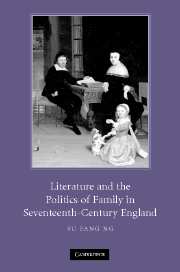Book contents
- Frontmatter
- Contents
- Acknowledgments
- Introduction: strange bedfellows – patriarchalism and revolutionary thought
- PART I REVOLUTIONARY DEBATES
- 1 Father-kings and Amazon queens
- 2 Milton's band of brothers
- 3 Hobbes and the absent family
- 4 Cromwellian fatherhood and its discontents
- PART II RESTORATION IMAGININGS
- Epilogue: the family-state analogy's eighteenth-century afterlife
- Index
3 - Hobbes and the absent family
Published online by Cambridge University Press: 22 September 2009
- Frontmatter
- Contents
- Acknowledgments
- Introduction: strange bedfellows – patriarchalism and revolutionary thought
- PART I REVOLUTIONARY DEBATES
- 1 Father-kings and Amazon queens
- 2 Milton's band of brothers
- 3 Hobbes and the absent family
- 4 Cromwellian fatherhood and its discontents
- PART II RESTORATION IMAGININGS
- Epilogue: the family-state analogy's eighteenth-century afterlife
- Index
Summary
In his Observations Concerning the Originall of Government, Upon Mr Hobs ‘Leviathan,’ Mr Milton against Salmasius, H. Grotius ‘De Jure Belli’ (1652), the theorist of patriarchalism Sir Robert Filmer writes,
With no small content I read Mr Hobbes' book De Cive, and his Leviathan, about the rights of sovereignty, which no man, that I know, hath so amply and judiciously handled. I consent with him about the rights of exercising government, but I cannot agree to his means of acquiring it. It may seem strange I should praise his building and yet mislike his foundation, but so it is.
Suggesting that Hobbes would do better to adopt a patriarchal basis for government, Filmer wishes Hobbes
would consider whether his building would not stand firmer upon the principles of regnum patrimoniale [a paternal kingdom], as he calls it, both according to Scripture and reason – since he confesseth the “father being before the institution of a commonwealth” was originally an “absolute' sovereign” “with power of life and death”, and that “a great family, as to the rights of sovereignty is a little monarchy.”
Grouping Hobbes with Milton and Hugo Grotius, Filmer disapproves of the means of Hobbes's political theory though not the ends. All three authors were in some way contractualist theorists. But in his opening remarks Filmer registers some genuine bafflement as well.
- Type
- Chapter
- Information
- Publisher: Cambridge University PressPrint publication year: 2007



